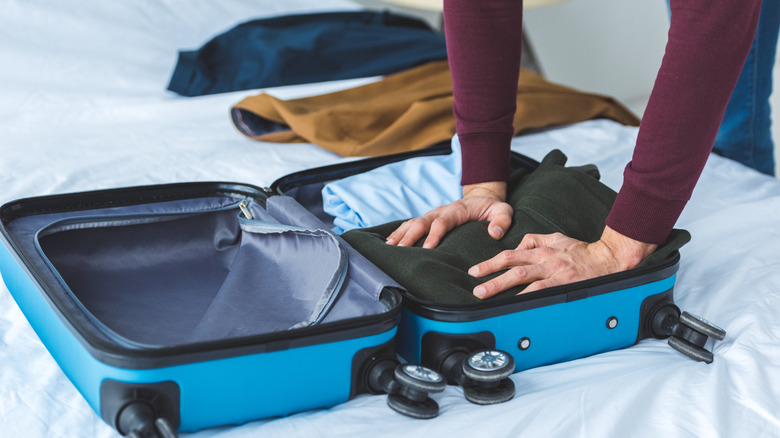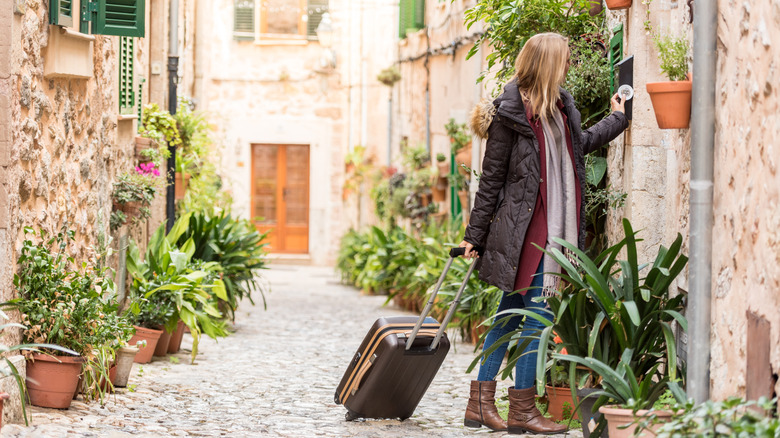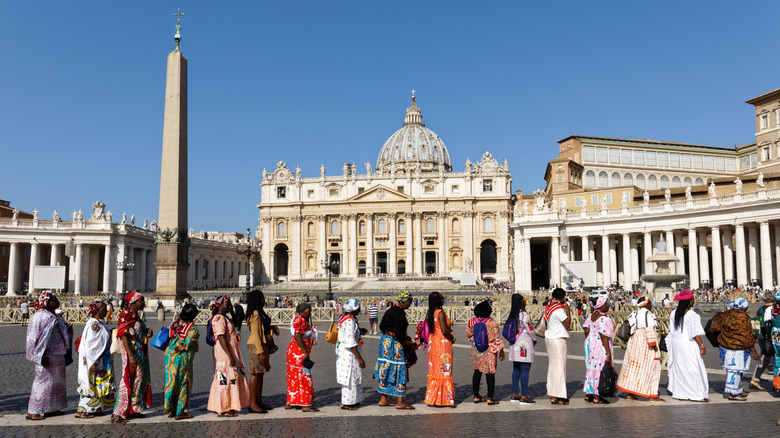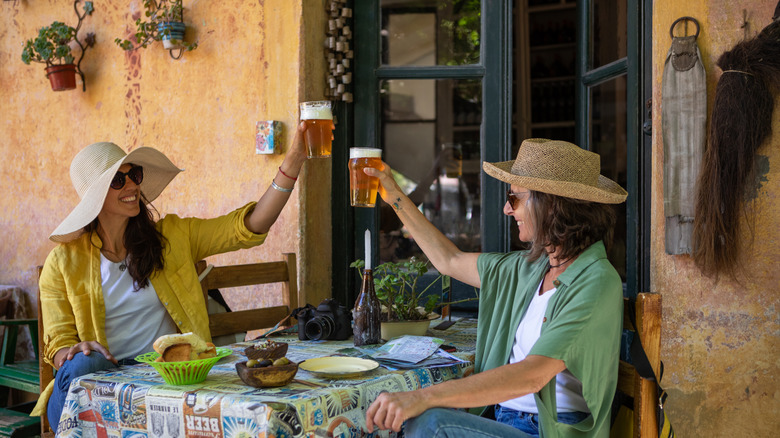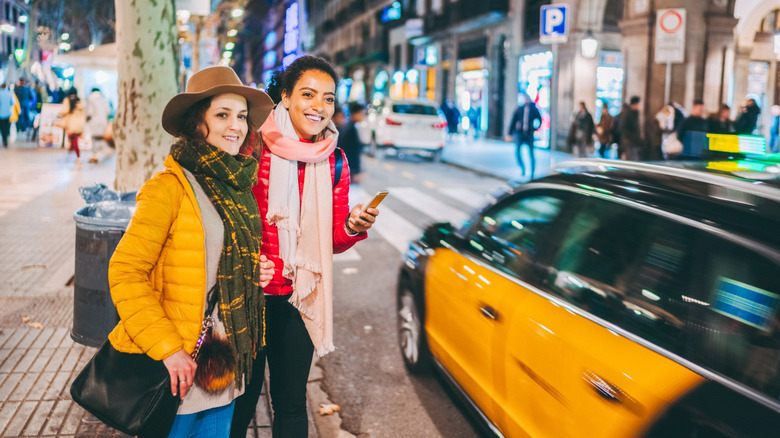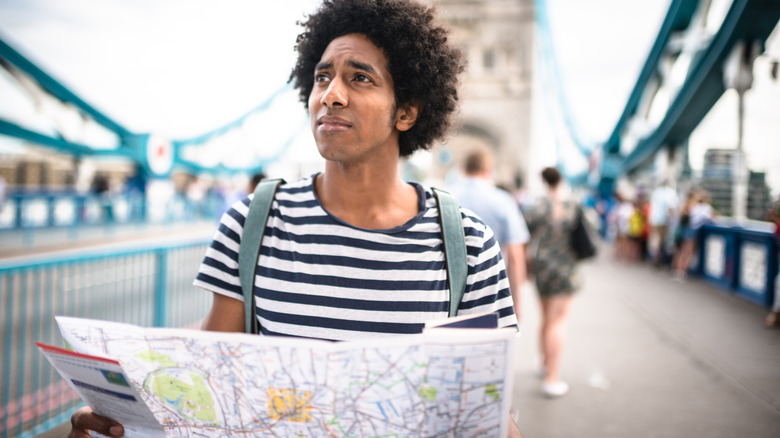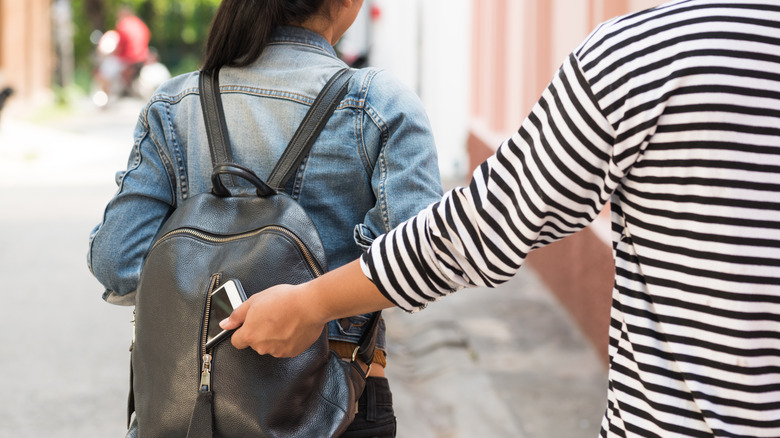The Top Travel Tips We've Learned From Rick Steves
It's rare to meet an avid vacationer who hasn't heard of Rick Steves, especially if they like to adventure in Europe. The Gordon Ramsay of travel, this American wanderer has toured the globe and shared his tips, tricks, and insider knowledge with a vast fan base through his popular guidebooks, syndicated column, television show, radio show, and website. With the help of Steves' expertise, myriad travelers have learned to streamline the process, including flight bookings, hotel reservations, and avoiding long lines at top tourist attractions.
From straightforward tips on packing less and researching a destination before visiting to first-hand advice on protecting yourself from pickpockets and boosting your cultural exposure by staying at a local B&B, we can learn much from Rick Steves. No wonder he's so popular! We checked out Steves' blog, scoured through guidance on his website, and read multiple articles to find some of his most helpful suggestions. Whether planning a last-minute vacation or scheduling a trip a year in advance, these tips will guide you toward a happy, healthy, and successful getaway.
Get organized before you go
Whether it's a sightseeing itinerary, hotel booking, or dinner reservation, organizing and planning before you travel can help relieve tension later. Some museums require advanced booking, for instance. If you get your tickets beforehand, you can show up at your allotted time, skip the queue, and get right to the best part: exploring. If you have a must-try eatery on your bucket list, Rick Steves said in an interview with Travel + Leisure, "you would be really wise to put it on your list of things to make a reservation for in advance." That way, you can look forward to your meal instead of worrying about getting turned away at the door.
When it comes to booking accommodations, Steves is of two minds. First, he loves the freedom of changing destinations on a whim. Reserving a room at the last minute makes this easy — nothing ties you to a particular place. But Steves also understands the effects of a long day of travel. In an article on his website titled "Reserving Rooms as Your Travel," he advised "booking in advance for the first few nights, as finding a room when jet-lagged can be stressful." In another piece about researching a trip, Steves suggested getting to know the area you plan to visit. Read an updated guidebook, consult a map, visit tourist information websites for advice, and check out the local sites associated with the destination to get the lay of the land.
Don't check a bag
Sticking to carry-on luggage isn't a new idea, nor is it solely associated with Rick Steves. Traveling with a bag that can fit in the overhead bin will save you money, time, and potential delays. Plus, limiting yourself to a carry-on can help you fly standby or jump on an earlier flight. It also eliminates worries about lost or stolen luggage. "It's more important than ever to travel light," Steves explained to Travel + Leisure. "Two weeks, two months, man, woman, winter, summer, it doesn't matter, you just need a carry-on bag."
Not sure how to whittle down your want-to-brings to must-haves? In an article on his website about packing light, Steves suggested spreading everything you want to bring on the floor. Be honest when looking at the piles and decide what you really need versus what items (like soap and shampoo) you could buy when you reach your destination.
Instead of packing a heavy coat, Steves advised adding layers to your suitcase. And remember, you can always do laundry somewhere, so there's no need to overpack. Trust us, it's possible to pack for a seven-day vacation in only one carry-on. Using packing cubes is another great tip. They help organize your belongings and compress clothes to occupy less space in your bag. Are you traveling by yourself? There are five items every solo traveler should pack: a backpack, an action camera, a tablet, a smartphone sanitizer, and a GPS messaging device.
Take steps to stay healthy
Nothing can derail a trip quicker than an illness or injury. Whether it's a cold, food poisoning, or something more serious, staying on top of your health while traveling is essential. In an article on his website titled "Tips for Healthy, Happy Travels," Rick Steves said the first step to staying well begins on the plane. To avoid dehydration, he suggested eating light meals, drinking plenty of water or juice, and avoiding coffee, alcohol, and sugar. Get up and walk around on long flights to reduce your risk of blood clots. This can also help with boredom and discomfort.
Steves wrote that it's important to eat nutritiously despite being on vacation. "Budget travelers often eat more carbohydrates and less protein to stretch their travel dollars. This is the root of many health problems," he stated. "Protein helps you resist infection and rebuilds muscle." So be sure to add protein to at least one meal per day.
Other health-saving tips include actions that are likely common knowledge, like washing your hands frequently (pack sanitizer for times when soap and water aren't easily accessible), exercising, and sleeping for 7 to 8 hours each night. While you may have access to a pharmacy or drugstore at your destination, in a separate piece titled "Medical Care in Europe," Steves advised packing any prescription medications, over-the-counter pain relievers, and other meds (i.e., for colds, motion sickness, constipation, and diarrhea) to prepare for anything.
Live like a temporary local
To experience a more authentic vacation, Rick Steves told Forbes that he recommends traveling like a "temporary local." That means you should stay in small, family-run hotels and guesthouses. These types of accommodations are often quaint, comfortable, and budget-friendly. They also tend to offer a more personal touch than larger, more expensive hotel chains. Plus, Steves said in an article on his website about European B&Bs that local accommodations keep tourists "closer to the everyday life of the culture [they] came to experience." B&Bs are a favorite accommodation choice for Steves. "Staying at a European bed-and-breakfast is a bit like having your own temporary mother while you travel," he explained.
Steves suggested dining at restaurants outside the tourist zones when it comes time to eat. Go where the locals go, and you're in for a tasty, fresh, and affordable meal, he said in his website's article about eating well in Europe. If the menu is handwritten, Steves told "Forbes," "that means they are catering to savvy locals, serving what's seasonal and fresh in the market." In other words, you're more likely to enjoy your food choice and get it at a reasonable price.
Don't ignore lesser-known destinations
There's nothing wrong with having your heart set on visiting tourist hot spots like Europe's Venice, Paris, and London. These historical gems are traveler heavyweights for a reason –- they're chock full of landmark attractions, stellar restaurants, luxurious hotels, and plenty of interesting things to do. However, by only visiting these A-list locales, you're doing yourself a disservice. It's the "second cities," as Rick Steves called them in an interview with The Seattle Times, i.e., the lesser-known destinations, where you'll find fewer crowds and often equally as noteworthy (or potentially even more remarkable) points of interest. So next time you're in Barcelona, why not tack on a visit to Figueres, where you'll find a truly impressive and unforgettable museum dedicated to former resident Salvador Dalí, not to mention excellent restaurants.
In an article on his website titled "Europe Trip Itinerary Tips," Steves suggested alternating big cities with smaller villages and countryside. "Break a Venice-to-Florence-to-Rome trip with an easygoing time in Italy's hill towns or on the Italian Riviera," he wrote. That way, you'll be able to sneak in a little peace and quiet while soaking up the beauty in these Elysian spots, giving you a more well-rounded view of the country. As Steves stated in that same article, "Judging Italy by Rome alone is like judging America by New York City."
Time your visits
Sometimes, you can't avoid uber-crowded cities and popular attractions. Whether it's due to your long-held desire to visit Rome in summer or your penchant for checking top tourist sites off your list, occasionally, there is no way around putting yourself in the middle of chaos. When that's the case, follow Rick Steves' advice: choose your timing well. "In the most crowded European cities," Steves said in an article on his website titled, "Traveling Against the Crowd in Europe," "it pays to get out early and stay out late." This way, you can be first in line for busy attractions like the Colosseum, or in Greece, you could hit the tail end of Athens' Acropolis queue by arriving just before this landmark attraction closes.
If your must-see tourist sites offer advance booking, take advantage of that option before heading out. Then, you can go to that specific point of interest without encountering any stress or time-wasting lines. If you're visiting a common cruise ship port in Europe (like Santorini, Dubrovnik, and Florence), this advice will come in particularly handy, Steves wrote in the article. These popular spots get swarmed by tourists on a day trip from the boat, which means the attractions will be super busy, especially at midday.
Step outside of your comfort zone
Part of the fun of traveling is experiencing the unknown and being open to new adventures, be they in the form of unique activities, exciting cuisine, or bespoke entertainment. Instead of sticking to a touristy part of town and eating in a well-known restaurant, for instance, Rick Steves recommends stepping outside your comfort zone, if only for a meal. If you're in Coimbra, Portugal, for example, he wrote in his website's article, "Top Travel Mistakes — and How To Avoid Them," he advises travelers to "leave the quaint Old Town and head to the local university's cafeteria to eat and practice Portuguese with students and professors." In doing so, tourists gain a chance to meet locals, learn about their culture, and create a new connection that will enhance their travel experience.
Leaving the tourist zone, Steves said, will get you away from crowds, high prices, and potentially disappointing food. Instead, wander even a few blocks away to find a new adventure filled with more ambiance, better cuisine, and happy locals. "By being open to differences and staying flexible," Steves shared in his article "Making the Most of Your Trip," "I have a better time in Europe — and so will you." Try new things and stop where you weren't expecting to. If you pass a street fair on your journey, take the time to check it out. In his article, Steves also suggested sitting beside a stranger at a bar and striking up a conversation.
Don't let saving money cloud your judgement
Just because something is cheap doesn't mean it's a good deal. In some cases, for instance, a less costly room with poor online reviews will cause more headaches than it's worth. If you hope to save money on accommodations, look for a charming B&B. In an article called "Thrifty 50 Travel Tips," Rick Steves wrote, "A B&B offers double the warmth and cultural intimacy for half the price." Plus, you're bound to get a good night's sleep, so you'll have more energy for sightseeing the next day.
"Smart travelers spend a little extra to polish off the rough edges of a trip," Steves said in "Making the Most of Your Trip." In other words, spending a small fee to secure an advance spot in line for a tourist attraction or opting for the slightly more expensive fast train is often worthwhile. Also, instead of futzing around with buses late at night, spend a few extra dollars on a taxi back to the hotel. Feeling too tired after your flight to figure out the city's public transportation? Save yourself the stress and hail a cab. Your time is valuable, so deciding when to splurge on things like a car share, taxi, or anything else that can help save you time or energy is essential to your happiness.
Expect problems and move on
It's rare for a trip to go perfectly. Whether you've arrived in Florence to find the Uffizi Gallery shuttered (the city's museums are closed on Mondays), hiked Scotland's Old Man of Storr only to find it too wet and stormy to marvel at the view, or lost your wallet to a pickpocket on the train in Rome, something's bound to go wrong on vacation. According to Rick Steves, the trick is to roll with it when things don't go your way. "No trip is without its disappointments," he shared on his website. "Travel is exciting and rewarding because it requires you to ad-lib, to be imaginative and spontaneous while conquering surprise challenges."
Yes, it can be frustrating and potentially scary when things don't go the way you planned — losing a wallet or passport can cause tension, especially if you panic. Instead, Steves advised in his article "Losing it all...and Bouncing Back" to stay calm and ask for help. Find someone who speaks English to assist you in dealing with local officials.
Prepare yourself for potential pitfalls before you leave home. Take photocopies of essential documents or upload digital files to the Cloud. In the same vein of preventing issues, Steves recommended calling the car rental agency the day before a trip to confirm the details of the arrangement. The same goes for hotel reservations and flights; double-check before you leave to ensure you won't hit any roadblocks.
Be vigilant
While no one wants to think about being pickpocketed on vacation, this is an unfortunate reality in many cities across the globe, especially when traveling through Europe. "Thieves target Americans not because they're mean but because they're smart," Rick Steves said in "Thrifty 50 Travel Tips." "They know we're the ones with the good stuff in our purses and wallets." When traveling, Steves suggested wearing a money belt. Keep your most important items (i.e., cash, credit cards, passport, driver's license, room key) in the belt and hide it under your pants, shirt, skirt, or other clothes. "You'll save money by not losing it," he explained. To ensure you and your belongings are well protected, know what to look out for and which places to avoid.
Any crowded tourist site (i.e., Buckingham Palace) or public train or bus (i.e., the Metro in Paris) is a prime spot for pickpocketers looking to make an easy score. "If you're not constantly on guard, you'll have something stolen," Steves wrote in "Outsmarting Pickpockets and Thieves" on his website. Protect yourself before leaving home by making copies (or taking photos) of important documents and keeping them in the Cloud in case something is lost or stolen while on vacation.
Keep a journal
No matter your age, it's impossible to remember every aspect of a trip. Jotting down memories in a journal (the old-school paper kind or an online version) is a great way to document and revisit your experiences. "I find that if I don't put the lessons of travel in my journal as they happen, these moments can be like shooting stars I just miss...or butterflies I thought I saw," Rick Steves wrote in a Facebook post.
Not sure how to start? It's easy. Sit down somewhere comfortable and start writing. In an article titled "The Zen of Travel Journaling," Steves recommended "[leaving] out the boring stuff." When rereading years down the line, you won't care what you ate at a not-so-great restaurant. You will, however, enjoy remembering the place's character, the important things you did, the people you met, and the way you felt while visiting.
Another of Steves' top tips for journaling is to avoid recording things in chronological order. Instead, he suggested writing about your surroundings or interacting with someone local. He said to be diligent about observing your surroundings and disciplined in writing often. Even if you only have time to jot down a few bullet points or rough thoughts, that's fine. You can always go back and flesh things out later.


